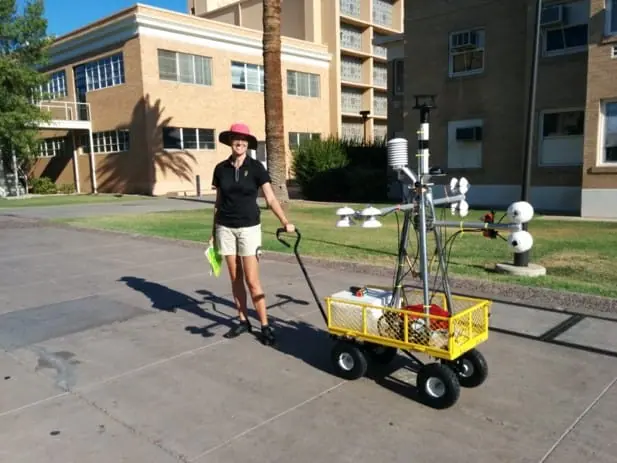UCRC Faculty Affiliate, Dr. Ariane Middel, Assistant Professor of the School of Arts, Media and Engineering, Herberger Institute for Design and the Arts, has been awarded an NSF Career Award for the project: Human Thermal Exposure in Cities – Novel Sensing and Modeling to Build Heat-Resilience.
Human thermal exposure to extreme heat is a growing health concern and pressing societal problem worldwide that will be exacerbated by climate variability, more frequent and intense heat waves, continued urbanization, and socio-demographic changes towards bigger economic disparities and a growing elderly population. The goal of this Faculty Early Career Development (CAREER) grant is to advance understanding of how the built environment impacts heat and human thermal exposure in cities. Bridging the gap between localized field-based work and large-scale, generalizable models, this transformative project will expand beyond the limits of conventional heat research and fundamentally reframe how heat is assessed in urban areas by using radiation-based metrics and indices. New academic-practitioner partnerships with cities will yield co-developed, solutions-oriented research that translates into actionable best practices for infrastructure management and human-centric heat hazard mitigation. This work aligns with NSF’s mission to advance public health and well-being. It has the potential to result in broader societal change by informing public policy to make communities more thermally comfortable and walkable, increase heat awareness, build adaptive capacity and community resilience to heat, and potentially reduce the incidence of heat-related illness and death.

The Faculty Early Career Development (CAREER) Program is a prestigious Foundation-wide activity that offers the National Science Foundation’s most prestigious awards in support of early-career faculty who have the potential to serve as academic role models in research and education and to lead advances in the mission of their department or organization. Activities pursued by early-career faculty should build a firm foundation for a lifetime of leadership in integrating education and research.